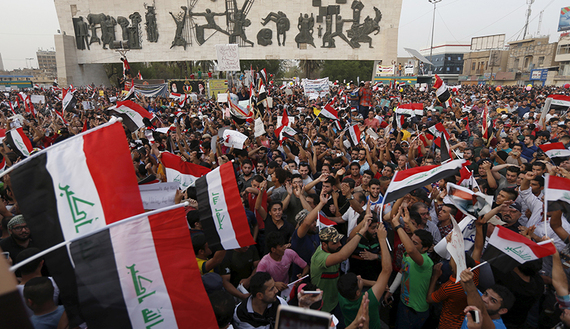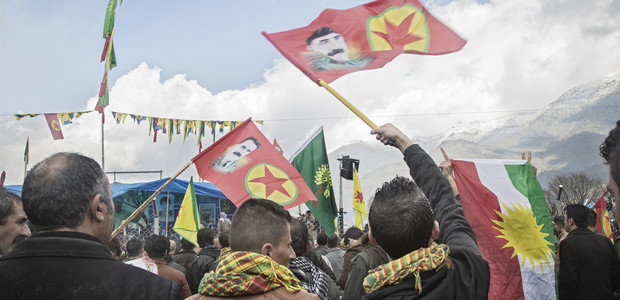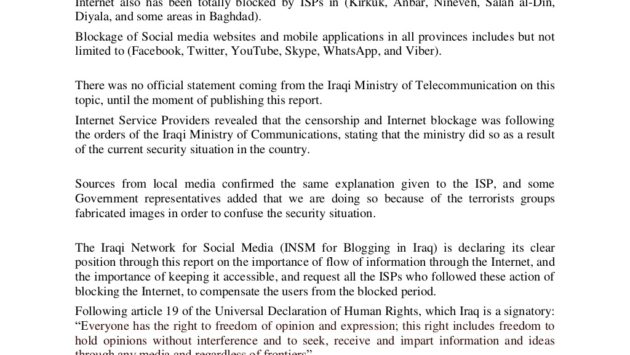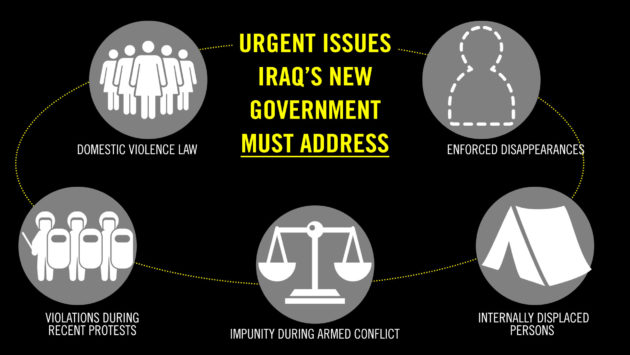Iraqis protest Corruption, Lack of Services while Politicians Blame Everyone but Themselves!
Al Monitor – Ali Maamouri

The July 16 killing of Muntazar al-Hilfi by police in al-Madina, north of Basra, during a protest for improved services was redolent of the death of Tunisian Mohamed Bouazizi on Jan. 4, 2011, which sparked the Arab Spring revolutions. Hilfi’s killing led to a series of massive protests throughout the central and southern cities that have continued until the time of this writing. Protesters are standing against rampant corruption in the country and the deterioration of services.
The religious authority in Najaf showed complete and full support to the protesters and called for promptly meeting their demands. The spokesmen for the religious authority in Najaf, Sheikh Ahmed al-Safi and Sheikh Abdul Mahdi Karbalai, who are the Friday preachers in Karbala, voiced their support. On Aug. 7, Safi said in his Friday sermon, “The people who have tolerated tough times, stood in the face of schemes and participated in elections to choose the political powers ruling them expect — and they are right to do so — those politicians to work hard to provide them with a good life. They also expect the political class to fight corruption and achieve social justice, in addition to overcoming sectarian and partisan considerations in order to reform the state’s institutions.”
Most of the parties that are part of the government — such as the Citizen Alliance (al-Muwatin) and the National Coalition (al-Wataniya) — expressed their reservations.
Baqir Jabr al-Zubeidi, leader of the Citizen Alliance, said of a protest, “Dubious political parties stand behind this protest and wanted to stir chaos, annoy the citizens and humiliate the government.”
Ayad Allawi, head of the National Coalition, voiced his support for the protests and blamed his political adversaries. He said, “We reiterate support for the rebellious protesters and we wish for the reforms that the people want to be implemented on a large scale.” He also called on the government to make real reforms that cater to the actual needs of citizens.
It was striking that Iranian official authorities and Iraqi parties known for their loyalty to Iran strongly opposed the popular protests, leveling numerous accusations against them and trying to stop them. It is noteworthy that pro-Iran Islamic parties dominating government were targeted by protesters because of their poor governing performance. The protesters also demanded a secular state in Iraq.
In this context, the chief of staff of the Iranian armed forces, Maj. Gen. Hassan Firouzabadi, said Aug. 9 that the ongoing crisis in Iraq is orchestrated and that protests are organized based on the instigation of well-known groups, non-Muslim ones sometimes, in order to portray the government in Baghdad as incapable. Firouzabadi called on the Iraqi people to beware of the machinations of enemies, to be patient and help the central government achieve progress and overcome problems.
On Aug. 7, Najaf’s Friday prayer imam Seyyed Sadr al-Din al-Qubanchi, known for his loyalty to Iran, called during his Friday sermon for refraining from participating in protests, saying that “[the protests’] objective is not reform but a return to nonreligious governance.”
Nouri al-Maliki — the former prime minister who lost his job as vice president when the post was eliminated in the first series of reforms by Iraqi Prime Minister Haider al-Abadi — issued a number of statements Aug. 9 strongly opposing the protests and protesters. He said on Aug. 10 in an interview with a number of media outlets that “the protests went outside of the framework they should have stayed within because of their use of slogans against religion and Islamic movements.” Maliki expressed concerns over the possible loss of security in the next phase in the event that protests become uncontrollable.
In an interview with Afaq TV on Aug. 14, he stated, “Today we face a new campaign of slogans and insults in the protests against the political symbols and religious scholars by the anti-religious movement,” adding that there are foreign projects complementing the Islamic State’s (IS) plan that stands behind these protests.
Al-Monitor talked with a number of activists and protesters over the phone. They indicated that they were attacked by gangs of thugs following the statements issued by those opposing the protests. Human rights activist Muhannad al-Gazi told Al-Monitor, “A gang whose members wear a green hoodie and carry posters of [Grand Ayatollah Ali al-Sistani] attacked the protesters Aug. 14, 2015, with knives and sticks. Two protesters were beaten and some women were pushed and humiliated.”
On Aug. 15, a source close to Sistani told Al-Monitor that Sistani strongly rejects these brutal acts and that his stances and opinions are only communicated by his office and official spokespersons and not by people on the ground. The source confirmed that Sistani stands strongly with the demands of the protesting masses calling for reform and fighting corruption in all Iraqi government institutions.
It should be noted that Sistani had previously raised demands similar to those of the protesters. Karbalai called for reforming the judicial system Aug. 15, hours before protesters raised slogans calling for such reform.
The ongoing protests in Iraq have brought together religious, civilian, secularist, communist and other communities. They all seek to reform the system and eradicate corruption within the Iraqi government. It seems that religious slogans and figures, especially Sistani, are exploited to attack the protests in order to create a rift between the protesters. This rift will push the secularist community to retaliate by attacking the religious community, thus leading it to drop out of the protests. This way it will be easy to suppress nonreligious protesters under the pretext of fighting infidelity and atheism.
The situation on the ground indicates that the Iranian or pro-Iran movements’ attacks and assaults on protesters by accusing them of being anti-religion, breaching religion or being affiliated to IS aim to defend specific Islamist parties with regional alliances with Iran.
In light of the Iranian authorities’ explicit attack on the protests and Sistani’s support for them, conflict between the two camps on the way to deal with Iraqi affairs seems to loom in the horizon. While Iran wants Iraq to be a key element in its regional camp against Saudi Arabia, Sistani wants to distance Iraq from the ongoing regional conflicts, as much as possible, to allow it to make independent decisions within the framework of an efficient and stable civil state.




